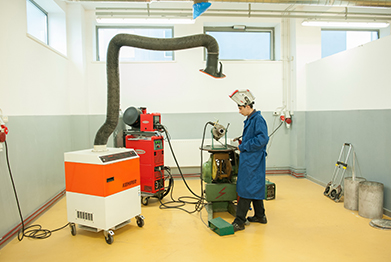Master's degree

The master's field in which this study programme integrates is Industrial Engineering. The duration of the studies is 2 years (120 ECTS credits). The purpose of the master's degree is to provide skills and competencies for a professional and research career in the field of Advanced Materials Welding Engineering. The study programme has correspondence with other master's programmes at international level, such as: Universitade del Vigo (Spain), Radboud University Nijmegenn (Netherlands), Cranfield University (England), Ohio State University (United States), University of Wollongong (United States), Montana Tech of the University of Montana (United States), PSG College of Technology, Coimbatore (India) - Welding Engineering.
Skills developed: Carrying out a diagnosis on the welding behaviour of advanced materials, skills to respond to new knowledge on the design of welding technologies by melting, pressure and other welding-related processes, development of technological design skills of welded structures and management of welding equipment, development of scientific research skills in the field of welding advanced materials.
Perspectives after graduation: European / international welding engineer; Research engineer as doctoral student; Specialist teacher in pre-university education; Welding inspection expert; Technical issues advisor.

The master's field in which this study programme integrates is Industrial Engineering. The duration of studies is 2 years (120 ECTS credits). The programme mainly involves the training of engineers capable of coordinating safety activities in industry, while taking account of the EU legal context on occupational health and safety designed to cover maximum risks with minimum legislation. Framework Directive 89/391 / EC (transposed in Romania by Law 319/2006 - Law on occupational safety and health) establishes the main principles of occupational risk prevention. EU actions in this area are required for better working conditions in the EU: greater safety at work, occupational risks must be assessed and protection measures must be in place. The general well-being at work is taken into account, considering both physical and psychosocial risks. This is why we train specialists who will be able to identify and prevent risks at work and to provide safety and a high level of satisfaction for their employees, while avoiding possible fines for non-compliance. Action at European level entails the same degree of protection and compliance with the minimum conditions for health and safety at work, regardless of the Member State.
Perspectives after graduation: Expert in occupational safety and health, Auditor and evaluator of management systems for occupational health and safety; Occupational safety and health manager.

The master’s field in which this study programme integrates is Materials Engineering.
The duration of studies is 2 years (120 ECTS credits), with the master’s students acquiring skills such as:
Completion of this study programme enables graduates to approach most professions in the field of Materials Engineering.
Perspectives after graduation: research engineer in process equipment; researcher in machine building technology; expert metallurgical engineer; research assistant in non-ferrous metallurgy; metal casting research engineer; research engineer in plastic processing and heat treatment; materials science research engineer; assistant lecturer; project manager; company administrator; research assistant in unconventional technologies and equipment, process engineer in rapid prototyping, expert in the field of ceramic and composite materials.